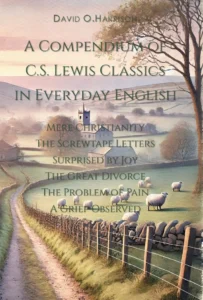
U.S. customers: Though this title isn’t distributed in the U.S., Americans may legally buy printed copies from Canadian sellers (use eBay link). U.S. copyright law restricts reproduction and distribution, not ownership. Under the First Sale Doctrine, purchase and resale are legal.
81% of readers of Mere Christianity in Everyday English have left ⭐️⭐️⭐️⭐️⭐️ reviews. It was created for all those who said, “I tried to read it but couldn’t make my way through it.”
When I first read Mere Christianity, I couldn’t help but wonder if the average North American reader could fully grasp the essence of this book without an English-to-“English” dictionary at their side. Even I, though born and raised in England, found myself Googling the meaning of some of Lewis’s colloquialisms from the 1940s. Lewis himself acknowledges the shifting nature of language and word usage over time, and I’ve taken the liberty to present you with an original paragraph of his work, alongside my own “simple English” interpretation.
Original text: A gentleman, once it has been spiritualized and refined out of its old coarse, objective sense, means hardly more than a man whom the speaker likes. As a result, gentleman is now a useless word. We had lots of terms of approval already, so it was not needed for that use; on the other hand, if anyone (say, in a historical work) wants to use it in its old sense, he cannot do so without explanations. It has been spoiled for that purpose.
Revised text: The word “gentleman” originally had a clear meaning. It referred to someone who had a coat of arms and owned land. When you called someone “a gentleman,” you were not complimenting them but stating a fact. If you said someone was not “a gentleman,” you were not insulting them but providing information.
The motivation behind my effort to rework the original manuscript of Mere Christianity aligns with what I believe inspired Lewis to write his book in the first place: to help readers discover their ultimate purpose and engage in a personal relationship with the living God.
Despite over seventy years passing since its initial publication, Mere Christianity continues to grace the best-seller lists, standing the test of time. It’s worth noting that the original text of Mere Christianity is now in the public domain.
C.S. Lewis, the renowned Professor of English at Oxford University, was a literary giant. Clive Staples Lewis authored many famous novels, including The Chronicles of Narnia and The Screwtape Letters. The most recent estimate for sales of his books is exceeds 200 million copies.
Lewis was born in 1898 in Belfast, Ireland, while I came into the world fifty-three years later in Worcester Park, England. Lewis endured the horrors of trench warfare at the Somme during World War I. I was conceived six years after the end of World War II. Lewis found solace in Christ at the age of 33, deeply influenced by his dear friend J.R.R. Tolkien and other spiritual companions. Similarly, it wasn’t until I reached the age of 35, also influenced by friends, that God broke through my hard, prideful shell and radically changed my life.
This Group Study Edition has been composed to facilitate discussions surrounding the practical realities of the Christian faith.
Enjoy!
Sign up for our Newsletter:
Site designed and maintained by Algonquin Digital.
Reviews
There are no reviews yet.